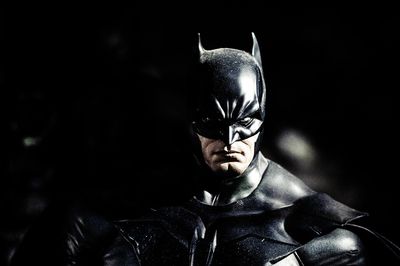Superhero Movies Are Dying in the Age of Coronavirus
We don't need a lone hero to rise up and fight the enemies. We need everyone to collectively stay the f*ck home.
Historically, superhero franchises have always thrived in times of great social turmoil.
Captain America burst onto the comic book scene in the midst of World War II as a metaphorical embodiment of American ideals punching Hitler in the mouth. It's no coincidence that Sam Raimi's 2002 Spider-Man—featuring the young, web-slinging savior of New York City—set the stage for the blockbuster superhero boom so shortly after 9/11. In times of trouble, people love to escape reality though fiction, and superheroes are, at their core, the ultimate power fantasy.
While most of us can't do anything to stop the plethora of bad guys in real life, we can take solace in the notion of Batman busting up crime syndicates and Iron Man shooting down terrorists. Even in dangerous worlds where evil intergalactic aliens control massive armies, superheroes are there to save the day.
But, blockbuster movies—superhero franchises most of all—face major logistical issues in a world under quarantine. With ticket sales no longer an option, companies like Disney really only have two options: Either indefinitely push back the release date or drop the movie on a streaming service. Neither option is great from a business standpoint.
Superhero movies, especially the ones that are part of a cinematic universe like Marvel or DC, are largely built around hype that constantly pushes audiences from one story to the next. If you want to see Infinity War 6: Thanos Gets Glasses, first you'll need to see Black Widow 3: Black Widow's Summer Vacation and Iron Man 19: Please Buy Toys of the New Suit, but they won't be on-demand until after Infinity War so you need to go to the theater. Not wanting to miss out on essential pieces of an ongoing narrative creates a solid impetus for audiences to come to theaters, even when they're not particularly excited about the specific movie they're going to see.
Marvel's multi-tiered game plan has run like clockwork since the pre-Avengers release of the first Iron Man movie in 2008. Taking an untold number of months off, thereby losing precious audience headspace, risks killing a business model that's been in motion for years.
On the other hand, immediately dropping a $100 million plus movie on online streaming, let alone two or three, would be a financial disaster, even for Disney. Whatever money they might get from new subscribers to Disney+ would barely put a dent in the massive loss of box office sales. It's hard to say what the next few years will look like for the movie industry, let alone the next few months, but it's very possible that we might be nearing the death of the superhero movie as we know it.
Maybe that's a good thing.
It turns out that reality is far colder than even the far reaches of Marvel's outer space. The superhero power fantasy is wonderful when we're escaping real-world issues that could hypothetically be solved with a few well-directed kicks to the groin, but it falls apart in the face of a pandemic like the one we face now. Coronavirus doesn't even have balls to kick.
Part of the problem with superhero power fantasies amidst a real-world epidemic is that their entire premise hinges on individualism. Superheroes are exceptional people, rising up to fight the enemies even when the chips are down, even when nobody else will. They are meant to be aspirational, and, as such, superheroes reflect a long-held cultural obsession with the shining idea of the rugged, take-no-sh!t American who does whatever they wants whenever they wants because they're free, goddammit.
But in the modern reality brought on by COVID-19, we don't need a lone hero to rise up and fight the enemies. We need everyone to collectively stay the f*ck home. Action is practically equivalent to inaction, and the people taking action tend to be selfish jackasses who believe that others should risk their own lives in order to give them haircuts.
Moreover, the closest thing we actually have to "superheroes" now are essential workers like doctors, pharmacists, and delivery drivers, and our broken system can't even support them properly. Point being, the inherent individualism baked into the very premise of superhero movies is the exact opposite of what we need to survive as a society right now.
If unfettered individualism is an actively lethal health threat amidst the coronavirus, perhaps it makes sense that the escapism we've been prioritizing (namely, Animal Crossing) is the kind that promotes peacefully working together for communal good.
Captain America may not be able to save the world right now, but maybe an island of friendly little animals can.
